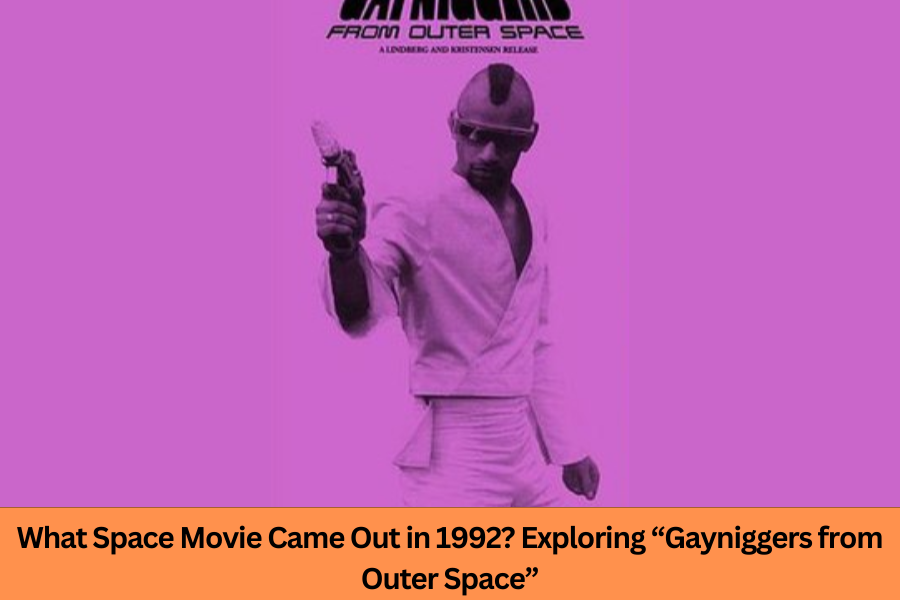Exploring “Gayniggers from Outer Space” (1992): A Provocative Sci-Fi Satire
In the expansive universe of science fiction, certain films leave a lasting impression not necessarily for their groundbreaking effects or visionary storytelling, but for their audacity in challenging social norms and provoking discussion. One such film, released in 1992, is Gayniggers from Outer Space. Directed by Danish filmmaker Morten Lindberg (also known as “Master Fatman”), this unique blend of satire, social commentary, and controversial content has continued to spark debate since its release.
While its provocative title may be enough to incite controversy, the film itself uses humor, exaggeration, and science fiction tropes to offer a bold commentary on issues of race, sexuality, and societal norms. In this article, we will explore the film’s content, its cultural legacy, and its significance in today’s discussions on satire and media representation.
The Title: Intentions and Controversies
The film’s title, Gayniggers from Outer Space, is deliberately provocative, combining racial and homosexual slurs. At first glance, it may seem offensive and shocking, leading many to question the filmmaker’s intentions. However, Morten Lindberg’s approach was rooted in satire and social critique. His aim was to parody not only the science fiction genre but also society’s stereotypical portrayals of race and sexuality. The use of such a controversial title challenges the audience’s comfort zones, forcing them to confront their own biases and the societal prejudices that permeate mainstream media.
By exaggerating and amplifying these stereotypes to an absurd degree, Lindberg intended to mock both the sci-fi genre’s history of marginalizing certain groups and the real-world bigotry that often goes unquestioned. The film’s title serves as a critical tool in this endeavor, immediately disorienting viewers and setting the stage for a reflection on how labels and societal norms create division. In many ways, the shock value of the title is intentional—it invites discussion and challenges audiences to think critically about why such language is offensive and how societal prejudices influence our perceptions.
Through this lens, Gayniggers from Outer Space can be seen as a bold experiment in using cinema as a medium for reflection, with its title serving as a confrontational device that draws attention to issues of race, sexuality, and discrimination. The film’s legacy, while contentious, highlights the power of provocative media to challenge social norms and spark conversations about sensitive issues.
Outer Space Plot and Parody
At its core, Gayniggers from Outer Space follows a group of black extraterrestrial beings who discover Earth and become disturbed by the presence of women, whom they believe are subjugating men. These aliens, hailing from the planet Anus, decide to eliminate all women on Earth to free men from their perceived oppression. Their mission is to create a new world order in which men, liberated from the influence of women, can live in peace and unity.
The plot, while absurd on the surface, serves as a satirical critique of traditional gender roles and societal expectations surrounding heteronormativity. By using an exaggerated premise—aliens eradicating women to free men—the film mocks the lengths to which societies will go to maintain male dominance. In doing so, it calls into question the very foundations of gender oppression and heteronormative structures.
Additionally, the film’s parody of classic sci-fi tropes plays a significant role in its commentary. Science fiction as a genre often explores the concept of ‘alien’ societies as a means of reflecting on our own. In Gayniggers from Outer Space, the alien characters’ intervention in human society serves as a mirror, reflecting the absurdities of gender inequality and the arbitrary nature of societal norms. The film’s extreme solution to Earth’s gender issues—eradicating women—is intentionally hyperbolic, designed to mock real-world attempts to uphold male dominance through gendered policies and segregation.
The humor in Gayniggers from Outer Space is broad, unapologetic, and designed to provoke thought about the absurdity of gendered oppression. For some viewers, the film’s satirical approach has been described as life-changing, offering a unique perspective on gender roles, sexuality, and societal expectations.
Cult Status and Legacy
Despite its controversial nature, Gayniggers from Outer Space has gained a cult following over the years. The film’s combination of satire, social commentary, and provocative humor has made it a subject of discussion in online forums and among cinephiles. Its rare status, audacious premise, and bold title have contributed to its popularity as a cult classic, often discussed not only for its controversial content but also for its attempt to address complex social issues through satire.
The film’s legacy is particularly notable because it emerged during an era when filmmakers felt more empowered to push boundaries and challenge viewers’ comfort zones. Audience reviews and critiques have further amplified its cult status, with some viewers appreciating its satirical take on gender and societal norms, while others remain skeptical of its methods and message.
One of the most enduring debates surrounding Gayniggers from Outer Space is its effectiveness as a satirical work. Does the film succeed in subverting racist and homophobic stereotypes, or does it inadvertently reinforce them under the guise of parody? These questions continue to keep the film relevant as both viewers and critics grapple with the answers. The film’s place in cinematic history is secure, not only because of its shock value but also because it represents a daring attempt to use cinema as a tool for social critique.
Moreover, the film’s legacy extends beyond mere entertainment. It has become a cultural artifact, representing a time when filmmakers were willing to confront social taboos head-on, even if it meant risking backlash. As the film industry continues to evolve, Gayniggers from Outer Space serves as a reminder of the role cinema can play in challenging and reshaping societal values.
Cultural Impact and Ongoing Discussions
Since its release in 1992, Gayniggers from Outer Space has sparked vigorous debates about the role of satire in cinema and its ability to address social issues effectively. The film’s use of humor and extreme scenarios to highlight societal prejudices raises important questions about the boundaries of satire and whether it can be a force for good or harm. Does the film’s exaggerated approach to gender and race challenge societal norms, or does it risk alienating its audience by crossing the line of offensiveness?
These discussions have made the film a subject of interest in academic settings as well, where it has been used in courses exploring media, gender, and race. Film studies programs often include Gayniggers from Outer Space as a case study for examining the ethics of representation and the responsibilities of filmmakers when addressing sensitive social issues. In this context, the film provides a provocative starting point for discussions about satire, power dynamics in storytelling, and how media shapes societal perceptions.
The ongoing interest in Gayniggers from Outer Space underscores its unique place in cinematic history. As debates surrounding representation and inclusivity in media become more sophisticated, the film remains a touchstone for conversations about the role of satire and the evolving responsibilities of filmmakers in addressing complex social issues.
Reflecting on Satire’s Double-Edged Sword
The satire in Gayniggers from Outer Space operates as a double-edged sword. On one hand, the film exposes the absurdity of bigotry by pushing its depictions to the extreme, forcing viewers to confront societal biases in a blunt and exaggerated manner. On the other hand, the film risks being misconstrued or dismissed as offensive, especially by audiences unfamiliar with its satirical intent.
This double-edged nature of satire is a critical element of the film’s legacy. It raises questions about how far satire can go before it crosses the line into reinforcing harmful stereotypes rather than subverting them. For some, the film’s approach is a sharp critique of societal norms; for others, it fails to achieve its intended message, becoming more of a provocation than a meaningful commentary.
Legacy in the Context of Modern Media
In the context of modern media, Gayniggers from Outer Space serves as a reflection on the evolution of film as a tool for social commentary. As discussions about representation, inclusivity, and the ethics of media content have become more prominent, so too have critiques of films like this one. Scholars and critics continue to revisit the film, questioning whether its approach to satire would be embraced or rejected in today’s cultural climate.
Conclusion
While Gayniggers from Outer Space may not have achieved mainstream success or critical acclaim, its bold approach to tackling issues of race, sexuality, and societal norms has cemented its place as a cult classic in the world of cinema. Through its provocative satire and exaggerated narrative, the film forces viewers to question the foundations of discrimination and the role societal norms play in perpetuating prejudice.
In the end, Gayniggers from Outer Space remains a polarizing piece of cinematic history—one that continues to provoke, challenge, and inspire discussion about the power of satire and the responsibilities of filmmakers in addressing sensitive social issues. Whether viewed as a misguided attempt at humor or a sharp critique of societal norms, the film’s legacy endures, ensuring its place in the annals of cult cinema.
Keep an eye for more latest news & updates on glamourtomorrow






